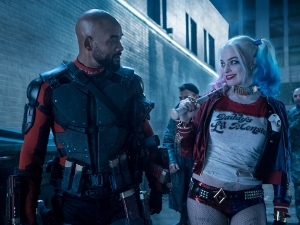Suicide Squad (2016)
[6]
While there are signs that Suicide Squad is a film rushed to completion and feels at times torn in different creative directions (sources report the studio made extensive revisions after the lukewarm reception of Batman vs Superman), the end product isn’t half bad. The first half of the film moves by very excitingly, as two-time Oscar nominee Viola Davis doles out backstory like it’s nobody’s business. Davis plays the head of a covert operations unit, whose idea is to bring together a group of imprisoned super villains to combat whatever the next meta-human threat to the world may be. The threat does indeed come, in the form of some supernatural villain of the week — a voodoo witch or some shit. Who cares — all these comic book movies have the same sort of world-destroying, interchangeable antagonist character. It’s more a gripe with the genre than Suicide Squad in particular. But I digress.
The rag-tag team of anti-hero heroes includes Will Smith as Deadshot, the best sharpshooter in the universe. Smith is back to where he needs to be in this movie — a cool damned movie star. Then there’s Margot Robbie as Harley Quinn, who plays a damaged psychotic in love with Jared Leto’s Joker. The Quinn character is a highwire act to me that falls apart under too much inspection. Robbie and writer/director David Ayer strike a good balance with her. She and Smith, along with Davis and Leto, give the movie a lion’s share of charisma. Leto may not be a lead in the film, but his character shows up every now and then. You can’t compare his Joker to Nicholson’s or Ledger’s — I think the verdict is still out. But would I like to see more of his interpretation? Sure. If I must.
Somewhere past the mid-point, Suicide Squad stops putting character front and center, and becomes more of a paint-by-numbers comic book action movie. To protect our PG-13 rating, our super villains mostly fight zombies — well, human-like things that look like a cross between charcoal and pulsating potatoes, anyway. The bad guys have to keep reminding us (verbally) that they are, in fact, bad guys, because in order to have any kind of third act, they have to genuinely stop being selfish and bad, and bond together to save the world. Even the most wicked villains often still have some humanity in them, and this group is no different. They long to be loved, they want to see their children, and they live with regrets. There are a couple of minor eye-rolling moments in the group catharsis, but I appreciate Ayer’s broad strokes.
The songs that litter the soundtrack help distinguish the film — it’s probably the best collection of songs in a summer movie since Guardians of the Galaxy. The action is sometimes a little too fast and disoriented, but nowhere near as incomprehensible as some Zack Snyder bullshit. And just in case I didn’t hit the point home hard enough earlier: Viola Davis is a bad-ass in this movie. This isn’t an Oscar nominee phoning something in for a paycheck. In a movie that claims to be about super villains, she’s actually the scariest one of all.



